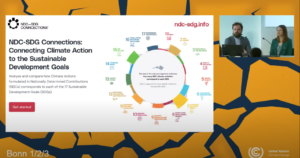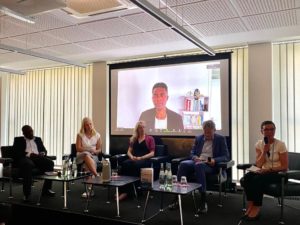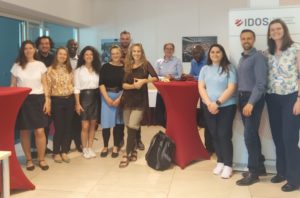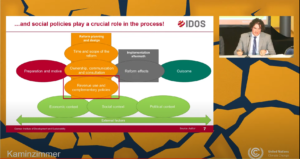The 58th intersessional meeting of the subsidiary bodies to the UN Framework Convention on Climate Change (UNFCCC) took place in Bonn from 5 to 15 June. Numerous mandated events provided space for advancing critical agenda items in the lead up to the 28th United Nations Climate Change Conference (COP28) in Dubai later this year. Like in previous years, IDOS, as an accredited observer organisation to the UNFCCC, has been actively engaged in various activities prior to and during the conference. This year, our climate policy experts have contributed to the discussions on the Global Stocktake, the Global Goal on Adaptation, the Work Programme on Just Transition Pathways as well as the Glasgow Dialogue on Loss and Damage.
CSSN Conference session
On 31 May 2023, the Climate-resilient and nature-compatible sustainable development through socially just transformation (Klimalog III) project team co-hosted a session on Funding Loss and Damage: Lessons from Obstruction in Climate and Development Finance.
Panellists discussed obstruction of Loss and Damage finance in the negotiations under the UN climate regime and how multilateral climate finance, humanitarian aid and ODA can be harnessed to help overcome obstruction of Loss and Damage funding.
The event was part of the 2nd Annual Conference on Global Climate Governance in the Face of Obstruction (31 May – 2 June 2023), organised by the Climate Social Science Network (CSSN) – a global network headquartered at Brown University in the USA. CSSN addresses current issues in climate policy: financing, loss and damage, opposition to renewables siting, climate obstruction, state-owned enterprises and petro-states.
Contributions to the UNFCCC official side event
During an official Side Event at the Bonn Climate Change Conference on 5 June, D. Gabriela Iacobuta (IDOS) and Dr Adis Dzebo (SEI) presented and discussed their research on contributions from climate activities in the Nationally Determined Contributions (NDCs) to the Sustainable Development Goals (SDGs).

In his opening remarks, Mr Minoru Takada, Team Leader Sustainable Energy, Division for Sustainable Development Goals at UN DESA, underlined the importance of evidence on synergies between climate action and sustainable development. Climate action necessitates a transition that addresses all dimensions of sustainability. Similarly, the 17 Sustainable Development Goals (SDGs) of the 2030 Agenda cannot be successfully implemented without strong action on climate change.
In their presentation, Adis Dzebo (SEI) and Gabriela Iacobuta (IDOS) demonstrated insights from a first analysis of 63 updated NDCs (Nationally Determined Contributions) submissions. Results show that even though updated NDCs increased in length and quality, activities for m
ost SDGs remain low. While activities in the economic dimension increased (except SDG 8 on decent work), activities in the ecological and social dimension of sustainable development show the opposite. Despite an increase in activities under SDG 5 (Gender Equality) and SDG 10 (Reduced Inequalities), and an increased focus on inclusive participation under SDG 16 (Peace, Justice and Strong Institutions), the number of activities on SDG 1 (No Poverty) and SDG 4 (Quality Education) as well as ecological goals like SDG 15 (Life on Land) rather decreased. Overall, the share of quantified activities remains below 20 percent.
This and more new data will be uploaded to the NDC-SDG Connections tool by July 2023. The tool has been developed jointly by the Stockholm Environment Institute (SEI) and the German Institute of Development and Sustainability (IDOS), and shows how activities in countries’ NDCs connect to all 17 SDGs.
After Dr Izzet Ari from Social Science University in Ankara added insights from his research on SDG-linkages in NDCs, a dedicated panel (representatives from Ecuador and Fiji, the Federal Ministry for Economic Cooperation and Development (BMZ) and the Climate Action Network (CAN) reflected on synergies between climate action and sustainable development, potential trade-offs and spill-over effects as well as challenges for implementation.
Access the record of the Side Event: The evolution of connections between Paris Agreement and the 2030 Agenda in the NDCs – YouTube
Book Launch „Africa’s Right to Development in a Climate-Constrained World„
On 5 June 2023 Klimalog and the African–German Leadership Academy to appreciate the publication of „Africa’s Right to Development in a Climate-Constrained World“ by IDOS partners of the Africa Research and Impact Network (ARIN).

Lead author Dr Kennedy Liti Mbeva of Oxford University provided an inspiring lecture on how African scholars contribute innovative perspectives to align African development aspirations with global climate action highlighting African leadership in international climate cooperation. Following a critical appraisal by Dr Julia Leininger, IDOS’ coordinator of Africa-related research and policy advice, the subsequent expert roundtable discussed pertinent challenges and opportunities for African governments and societies, and donor countries like Germany. The expert roundtable included the book’s co-author and ARIN founding director Dr Joanes Atela, Birgit Strube, head of Climate and Development Partnerships at the German Federal Ministry of Economic Cooperation and Development (BMZ), Anselm Durchrow of GIZ Morocco’s climate cluster, and Germanwatch’s policy advisor for energy policy and civil society in Africa and the MENA region, Kerstin Opfer.
From the discussion emerged a broad consensus that the complexity of a great climate transformation must be acknowledged, tackled and not ignored. Bold new patterns at domestic levels and in international cooperation are required to govern this complexity, including with regard to EU-Africa relations and Germany’s new ‘Africa Strategy’. Discussants also emphasised the imperative for mutual learning and understanding between different actors, institutions, countries and viewpoints in conceptualizing Africa’s climate and development agenda and just transition processes through practical lenses, rather than as a theoretical conundrum.
UNFCCC official side event by DEval, CAN Europe and CARE
On 6 June Klimalog co-lead Dr Steffen Bauer represented IDOS at an official UNFCCC side event at the SB58 that was co-hosted by DEval, CAN Europe and CARE International, focussing on strengthening climate finance for transformational adaptation and loss and damage action.
The event started with a presentation of CARE International’s latest instalment of the “Hollow Commitments” report on developed countries’ climate finance plans by Marlene Achoki (CARE Kenya), and a complementary contribution of Rachel Simon of CAN Europe on how the EU could move towards exploring innovative sources for new and additional finance. The subsequent panel discussion focused on how climate finance may help to achieve greater impact for transformational adaptation. The panel included experts from the Global Environment Facility, the European Bank of Reconstruction and Development, DEval, the Africa Research and Impact Network (ARIN) and IDOS.
Referring to ongoing Klimalog research, Steffen Bauer discussed inter alia the rationale to distinguish between adaptation finance and loss and damage finance. He emphasised the imperative to recognize and avoid the pitfalls of maladaptation, even in view of the increasing urgency to accelerate adaptation action.
Workshop on AI in climate policy analysis
On 6 June, the Klimalog project welcomed research colleagues from the African Research and Impact Network (ARIN), Stockholm Environment Institute (SEI), Munich Climate Insurance Initiative (MCII hosted at UNU-EHS) and the Frankfurt School of Finance and Management (FS) to a joint workshop.

The joint workshop with Climate Policy Radar (CPR) on “AI-powered climate policy analysis” with Climate Policy Radar (CPR) started with the presentation of the new Global Stocktake Explorer. The open AI-powered tool has been developed in cooperation with the UNFCCC Global Stocktake Unit and was launched officially within the Global Stocktake Technical Dialogue during the Bonn Climate Change Conference. The participants shared research tasks and challenges in analysing climate policy documents. With their experience from years of work on the NDC Explorer, the researchers were able to provide relevant contributions and impulses for the further development of AI-powered climate policy analysis tools, and the Global Stocktake Explorer in particular.
At the same time, they learned how the AI-powered tool can facilitate and accelerate their research work on the joint mission of enabling policy makers and stakeholders to make better informed and ambitious global climate policies.
UNEP/GEF launch of the Climate Transparency Platform
On 9 June, IDOS had the privilege to host the launch of the Climate Transparency Platform in a joint event of the UNEP Copenhagen Climate Centre and the Capacity-building Initiative for Transparency Global Support Programme of the Global Environment Facility (GEF).
Dr Steffen Bauer, in his welcome note, highlighted the importance of transparency as a means to build and sustain trust in multilateral climate governance and, hence, as essential to foster international climate cooperation and to advance the implementation of the Paris Agreement. A host of partner perspectives, including appraisals from the UNFCCC, the UNDP, UNEP and ICAT as well as pilot countries Chile and Peru, complemented the launch of the platform.
IISD side event on fossil fuel subsidy reform
On 10 June, IISD hosted a discussion on the need for action on fossil fuel subsidy reform and shifting of other public financial flows with contribution by IDOS researcher Mauricio Böhl Gutierrez.

Fossil fuel subsidy reforms have the potential to raise finances and reduce carbon emissions, due to increased prices for energy. Together with colleagues from UNDP and UNEP Mauricio Böhl Gutierrez provided technical input on the role of social protection policies in the reform process based on his in the COVCLIM project.
While the United Nations panellists focused on the estimation of fossil fuel subsidies, Mauricio Böhl Gutierrez highlighted the challenging political economy environment during reforms. Strong evidence shows the regressive nature of fossil fuel subsidy reforms. Thus, many countries successfully shifted towards cash transfers that provide better protection to poor and vulnerable households when removing subsidies. Well-planned reforms can create a bi-directional relationship between fossil fuel subsidy reforms and social (protection) policies. Reform processes benefit from mitigation policies, and governments can reinvest saved funds into their social protection infrastructure.
Workshop on Loss and Damage in fragile states
On 12 June, IDOS organised together with the Working Group on Peace and Development (FriEnT), International Alert and Brot für die Welt an expert workshop on „Linking Loss and Damage to Conflict Affected and Fragile Settings“.
The workshop addressed the pressing issue of climate-related loss and damage in the context of violent conflicts and fragile settings, highlighting the importance of conflict-sensitive, tailored funding arrangements. Jahan Roshwan Moni from Association on Land Reform and Development in Bangladesh and Mohamed S. Conteh from the Sierra Leone Network on the Right to Food in Sierra Leone shared first-hand empirical insights on sea-level rise and climate-induced migration and discussed them with policy makers and practitioners.
Saleemul Huq, Director of the International Centre for Climate Change and Development (ICCCAD) in Bangladesh, underscored the need to involve local communities as he emphasised the urgency of addressing loss and damage based on real-world experiences that adequately reflect local contexts and concerns. Hanspeter Schwär of the German Federal Ministry of Economic Cooperation and Development (BMZ) reaffirmed that local communities must indeed be part of the discussions that will improve their livelihoods. Sinead Walsh, Climate Director at the Irish Department of Foreign Affairs and member of the Transitional Committee, which currently negotiates a Loss and Damage Fund and funding arrangements, emphasised in turn the need to ensure that loss and damage finance actually reaches the most vulnerable.
Moreover, the workshop underscored that the plight of vulnerable populations living in conflict and fragile settings needs greater attention in international climate policy to advance a more comprehensive understanding of climate justice that leaves no one behind. A report summarizing the key takeaways and recommendations is currently under preparation and will be published in the run up to the upcoming COP28 negotiations.

Schreibe einen Kommentar